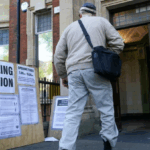Marks & Spencer (M&S) chief executive Stuart Machin has warned that UK retailers are facing mounting financial pressures due to increasing tax burdens, likening the situation to being “raided like a piggy bank.”
Writing in The Sunday Times, Machin criticized the government’s latest tax policies, including higher National Insurance Contributions (NICs) for employers and a forthcoming packaging levy. He urged ministers to ease the financial strain on businesses by staggering tax hikes and rethinking their approach to business rates.
Retail Sector Faces Rising Costs
Among the most significant changes affecting retailers is the increase in employer NICs set to take effect in April. The government will raise the NIC rate and lower the income threshold at which employers must contribute, dropping it from £9,100 to £5,000. Additionally, the National Living Wage is set to rise, further increasing employment costs for businesses.
Machin acknowledged that some of Chancellor Rachel Reeves’ proposals, such as a focus on long-term planning and infrastructure investment, were “commendable.” However, he argued that immediate relief for retailers should be a priority if the government is serious about boosting economic growth.
The Treasury defended the tax increases, stating they were necessary to protect public services. A spokesperson also highlighted that exemptions for smaller businesses would mean more than half of employers would see no change or a reduction in their NIC bills.
Calls for Tax Relief and Reforms
M&S, along with other major retailers, has been vocal in its opposition to these tax hikes. In November, the company joined a letter from the British Retail Consortium urging the government to reconsider some of the proposed measures.
Machin warned that unless action is taken, the retail industry will face significant challenges. “There is no doubt that there will be fewer jobs, fewer shops, and slower wage growth across the sector as a whole,” he wrote.
In addition to NIC increases, Machin also criticized the upcoming Extended Producer Responsibility (EPR) scheme, set to take effect in October. Under this policy, businesses will be required to cover the full costs of recycling and managing packaging waste. The British Retail Consortium estimates this will cost the sector £2 billion.
Machin argued that the policy would lead to excessive tax burdens without improving recycling systems, stating: “EPR will give retailers a tax bill 20 times the current amount, with £2bn going straight to the Treasury as general taxation and no improvement to recycling.”
Government Defends Economic Strategy
The Treasury maintains that its budgetary measures aim to stabilize the economy and create conditions for long-term growth.
“In addition to capping corporation tax for the duration of parliament, we’re permanently cutting business rates for retail, hospitality, and leisure on the high street from 2026,” a spokesperson said.
However, Machin and other industry leaders are calling for urgent action, including phasing in the NIC increases over two years and delaying the EPR fees to give businesses time to adjust.
As UK retailers navigate these rising costs, the debate over taxation and economic policy is set to continue, with growing pressure on the government to reconsider its approach.
















